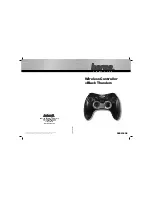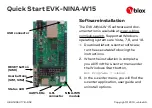
Page 50/82
NEXO
A
NALOGUE
PSTD
C
ONTROLLERS
8.4.1 Read before use
The Analogue TDcontroller is designed to be used with its proper set of speaker cabinet. They are not
interchangeable. Its main functions are:
To optimize the response of the system
When operating with the SubBass system (optional), splitting the stereo (2 channel) signal into 2
frequency bands (PS and dedicated SubBass system)
Active protection of the cabinets by dynamic audio signal processing (Temperature and
Displacement servo control)
Reduction of amplifier overload (Peak limiter function)
Analogue TDcontrollers also feature:
Stereo operation (2 independent channels) for the main system
Global switchable output level
Adjustable level on the SubBass channel
High CMRR input stage and High current drive output
Compensation of power compression effects on the system response curve.
The Analogue TDcontroller is designed to be inserted between the Audio source (console, preamplifier,
etc.) and the power amplifier.
8.4.2 Front Panel
Most front panel functions and indicators are located inside 2 distinct windows: left-hand areas relate to
functions and indicators dedicated to the optional Sub-bass section, while right-hand window contains
indicators
concerning
servo
control
operation
for
the
PS
cabinets.
For more technical details about servo control operation and internal electronic processing, please refer
to section “TDcontroller REFERENCE GUIDE.” Page 53.
Turning the LS channel Overlap / Crossover
Pushing the CONFIGURE button
modifies the high pass filtering. It
does not affect the sub output, which
will always be a filtered sub signal.
(This is therefore not a Sub on/off
button). In the « Overlap » position,
PS is exploited to its maximum
capability.
This position should be used if the system is being used without a Subbass. It can also be used with the
Subbass; In this case, there will be a boost in the crossover area. The « Cross over » position is
generally recommended when using the Subbass.
Summary of Contents for PS Series
Page 17: ...CONNECTION DIAGRAMS Page 17 82 5 CONNECTION DIAGRAMS 5 1 PS8 LS400 with PS8 TDController ...
Page 18: ...Page 18 82 CONNECTION DIAGRAMS 5 2 PS8 LS400 with NXAMP4x1 ...
Page 19: ...CONNECTION DIAGRAMS Page 19 82 5 3 PS8 LS400 with NXAMP4x4 ...
Page 20: ...Page 20 82 CONNECTION DIAGRAMS 5 4 PS10 LS600 with PS10 TDController ...
Page 21: ...CONNECTION DIAGRAMS Page 21 82 5 5 PS10 LS600 with NXAMP4x1 ...
Page 22: ...Page 22 82 CONNECTION DIAGRAMS 5 6 PS10 LS600 with NXAMP4x4 ...
Page 23: ...CONNECTION DIAGRAMS Page 23 82 5 7 PS15 Passive RS15 Omni with PS15 TDController ...
Page 24: ...Page 24 82 CONNECTION DIAGRAMS 5 8 PS15 Passive RS15 Omni with NXAMP4x1 ...
Page 25: ...CONNECTION DIAGRAMS Page 25 82 5 9 PS15 Passive RS15 Omni with NXAMP4x4 ...
Page 26: ...Page 26 82 CONNECTION DIAGRAMS 5 10 PS15 Active with NXAMP4x4 ...
Page 56: ...Page 56 82 TECHNICAL SPECIFICATIONS 9 1 2 Dimensions ...
Page 59: ...TECHNICAL SPECIFICATIONS Page 59 82 9 2 2 Dimensions ...
Page 62: ...Page 62 82 TECHNICAL SPECIFICATIONS 9 3 2 Dimensions ...
Page 66: ...Page 66 82 TECHNICAL SPECIFICATIONS 9 5 2 U Bracket for PS10R2 VNT SSBRK10 Parts Dimensions ...
Page 67: ...TECHNICAL SPECIFICATIONS Page 67 82 9 5 3 U Bracket for PS15R2 VNT SSBRK15 Parts Dimensions ...
Page 73: ...TECHNICAL SPECIFICATIONS Page 73 82 9 6 2 PS10R2 U Bracket VNI UBRK10 Parts Dimensions ...
Page 74: ...Page 74 82 TECHNICAL SPECIFICATIONS 9 6 3 PS15R2 U Bracket VNI UBRK12 Parts Dimensions ...
















































